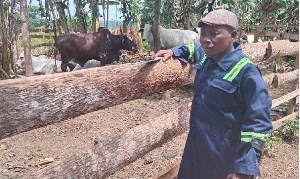Ghanaians all over the world climaxed Ghana's 50th Anniversary on March 6, this year. Indeed, this Golden Jubilee is worth celebrating. Ghanaians before and after March 6, 1957 have traveled a journey of difficult twist and turns stretching from proto and post nationalism uprisings, attainment of independence, era of military regimes down to the adoption of the 1992 constitution. It should be noted that, liberty and for that matter freedom from colonial rule leading to self-government is at least a feat that Ghanaians can boast of. Throughout these 50 years of journey, Ghana has demonstrated to the rest of the world that “the Blackman is capable of managing his own affairs”[1]. The Ghanaian economy has transformed in almost all field of endeavour in a positive manner since our cherished independence day. Besides, Ghana continues to play leading role in her quest to ensure the advancement of Africa. It is therefore not accidental when the theme:
“Championing African Excellence” was chosen for the anniversary.” The success of your country to achieve political stability and walk into a path of progress, development and economic growth, sets the example for other African countries and would be of immense benefit to the future of the continent” remarked by Mr. Noam Katz, Ambassador of the state of Israel to Ghana.[2]
One of the objectives of this jubilee celebration is to look forward to the future, to our vision of excellence in all fields of endeavor in the next fifty (50) years toward, and to our centenary birthday as a nation.[3] It is submitted that this colourful objective can be achieved by using the law as a tool for a change in the Ghanaian society. Ghana would have been better of now in all sectors of the economy but for lawlessness. Mr. Tony –Gyasi, the chairman of the University of Ghana council, in his contribution to the discussion after a forum on “Carrying Everyday Along in National Development, Agenda for Reducing Disparity in Human Welfare”,[4] lamented that in Ghana today, people flouted rules and regulations with impunity but were never punished, thereby seriously affecting the social, political, health and economic growth of the nation. He said it was unacceptable for people to litter the streets, dump refuse indiscriminately, park their cars at unauthorized places, fail to pay taxes, sell at undesignated places, all under the guise of ignorance. Mr. Oteng Gyasi said that it was disheartening when people were made to have their way at the expense of national good and development. According to him, people in developing countries did not litter the environment even where there were no trash cans and they complied with notices the authorities has mounted on posts advising people to “carry your trash”. It is jointly advocated that people should be dealt with according to the law, and that ignorance of the law is no excuse, “the very act of applying sanction is in itself a form of education for the people”.
Lord Scarman in Duport Steels Ltd v Sirs[5] defined law as “the body of rules and guidelines within which society requires its judges to administer justice”. Law plays a significant role in the successful operation of business and society. Law regulate social behaviour, which leads to a society that runs efficiently. Law also supply ethical standards and expectations, while providing rules of conduct, measures to enforce those rules, and means for settling disputes[6]. Other functions of law include peacekeeping; checking governmental power and promoting personal freedom; facilitating planning and the realization of reasonable expectations; promoting economic growth through free competition; promoting social justice; and protecting the environment. Besides, law protects the weak from being molested by the strong; controls and keeps in check those who are social deviant and misfit (hardened criminals); provides an avenue through courts for the peaceful settlement of disputes so that, people will not resolve to violence and finally, law lays down the framework for business transaction to take place. Law affects everyday life and society in a variety of ways. It is important to note that without laws to govern the actions of people and businesses, society would not be able to function effectively, and commerce would likely collapse. Indeed Aristotle, the ancient Greek philosopher meant it when he stated in 350BC that “the rule of law is better than the rule of any individual”. Ghana must be a place when law and order will prevail, where everybody will respect the right of others and will refuse to make moves which will create anarchy.[7]
Ghana over the past decades has been experiencing some grievous challenges which need to be addressed by using the law as a tool for change. These canker include corruption, bureaucracy, cocaine saga, indiscipline in the highest order, harmonization and standardization of customs and so forth.
In his key note remarks[8] Dr. Paul Wolfwitz, President, World Bank Group stated that though Ghana has strengthened its public management and procurements systems, the Peer Review Mechanism states that 75 percent of Ghanaians continue to believe that corruption is a serious problem. “Corruption is a disease that poses a serious obstacle on the road to development draining resources from the poor and hurting private sector growth’, he added. He suggested some key steps such as strengthening the skills of Ghana’s accountability institutors such as the commission of Human Rights and Administrative Justice and doing more to empower communities to responsibly manage and monitor the use of public resources to help fight this disease. This if done will ensure that public resources are used to bring health, education and jobs within the reach of every Ghanaian. According to CIPE Economic Reform (Feature Service) Vol 2, “Today, corruptions is recognized as one of the greatest obstacles to development and economic growth. This is not struggle of business against government, of ‘us’ against ‘them’, rather, it is a struggle for all of us to build stronger ethics across society at large.” Though for the past few years, many public officers who have been caught in this scandal have been prosecuted and imprisoned more need to be done – the law must be strictly applicable.
Dr. Paul Wolfwitz further stated that in spite of the steps Ghana is taking to improve its investment climate, local businesses lack access to credit. “It still takes more than a year to register property here. And it takes 81 days and half the average Ghanaian’s income to start a business”, he said. According to him, these long and costly procedures scare away international investors and discourage local entrepreneurs from starting a business – or if they do, they turn to the informal sector where their investments or labour rights are not protected by the law”. This obstacle needs to be addressed to ensure good investment condition.
The current cocaine saga needs to be fully addressed by the applicable laws to save our motherland’s long years self-worn image. Charles Takyi – Boadu report[9] that “Ghana Sours image Abroad” through the numerous cocaine sandals that have bedeviled the country in recent times. According to him, the latest series of reports is that United States Department of State 2007 International Narcotic Control Strategy Report (INCS R) on Ghana puts the country in the spotlight as a major transshipment point of illegal drugs; particularly cocaine. Last year, a series of cocaine scandals rocked the county, including allegation of police complicity in cocaine trafficking. The country’s law enforcement agencies have repeatedly raised concerns that narcotics rings were growing in size, strength, organization and capacity for violence. The report bemoaned that despite the regular arrests of suspected narcotics traffickers, the country has an extremely low rate of conviction, which law enforcement officials indicate was likely due primarily to corruption within the judicial system.
“The courts requirement of a surety is either dropped or court registrars will fraudulently use identical property as surety for multiple cases”
It is submitted that if the above is anything to go by, then this development is uncalled for. It is jointly submitted that though Ghana made progress in late 2006 in addressing its legislative and enforcement deficiencies, there is a long road ahead.
It is sad that though Ghana is 50 years old since independence, the report of instant “justice” improperly so called still keeps increasing in the country. Prof Henrietta J.A. N Mensa – Bonsu delivering the University of Ghana, Legon Inaugural lecture on the topic: Transplanting the English Oak: Legalism, Legality, Legal Pluralism and the criminal Law of Ghana[10] called for the re-examination of certain principles of the criminal law in the country to enable the to achieve the purpose of which the system was put into operation, adding that ‘criminal law ought to take into consideration the legal pluralism of the communities”. She said because most Ghanaians did not understanding and the appreciate the criminal law, the dissatisfaction was manifesting itself in efforts to resort to self – help methods amounted to the nurturing of the culture of disrespect for the justice system and laid down procedure for vindicating the law. Prof. Mensa –Bonsu said when people tool law into their own hands to lynch wrongdoers, they rendered the offence, however trivial, a capital offence, for which they appointed themselves accuser, prosecutor, judge and executioner all at the same time. She suggested that where traditional systems were not helpful, even effort ought to be made in improving the formal system of policing, instead of seeking to graft traditional methods of law enforcement onto modern systems. She said relying on clever legalisms might get a judge out of a tight spot in political terms but it might have wreaked great havoc on the lives of people whose lives depended on that decision and in the long run bring about the culture of impunity and disrespect for the law. It is jointly submitted that our existing laws need to be re-examined for them to be more meaningful. The recent revision of the laws of Ghana by the government via the judiciary is much recommendatory. Obnoxious and obsolete laws should no more be part of our history.
In the area of sanitation, there seem to less or no laws to shape the attitude of Ghanaians towards the environment. This indeed has contributed to the for numerous air borne and water borne diseases, desertification, ozone layer depletion and so forth. It is said that even the few international treaties that Ghana has been signatory to seem not to have had their corresponding (enabling) acts to make them enforceable in Ghana. Today, people dispose waste indiscriminately, benefit at the expense of the general public and take no step to ensure its natural maintenance. Our local councils and district assemblies because of political defeat are unwilling even to enforce the few bye-laws. Even decongestion exercise always become a mirage after plenty talks in the media. It is submitted that unless law enforcement becomes priority as a tool for change the nation can never move forward as we may seem to fancy about it.
Rule of law is the reason behind the success of every developed state. Factors that militate against its operation include: attitude of government; high rate of illiteracy; customs and traditions; delegated legislations, abject poverty; absence of socio-economic facilities and excessive use of emergency powers. Notwithstanding, it is submitted that conditions necessary for the application or realization of rule of law include; democratic environment, education, reasonable material well-being, opportunity to use prerogative, socio – economic facilities and so forth.
To be fair enough, since independence, thousands of laws ranging from Act of, parliament, decree and delegation legislations have been passed to ensure sanity in almost all sectors of the economy. This undeniably has contributed to the various achievement that we stand to celebrate today. While it is prudent so do away with obnoxious and obsolete laws to pave way for more successful stories, the problem of poor implementation and the enforceability of these laws need to bed addressed. This may be as a result of a political agenda or sometimes the inevitable public policy. No matter the reason that may be assigned, it is submitted that the law can only become a tool for social change where there is strict enforceability.
A tool is useful when it is used for the purpose of which it was manufactured.
--------------------------------- [1] Dr. Kwame Nkrumah
[2] “Daily Graphic”, Tuesday, March 6, 2007. page 5
[3] Ghana @ 50 Secretariat
[4] Organized by Institute of Economic Affairs (IEA) in Accra – ‘Daily Graphic’, Saturday, September 30, 2006. page 13
[5] (1950) I CR 161.2
[6] Don Blaheta/web@bladeho.org.
[7] ‘Daily Graphic’ Tuesday, March 7,2007. page 7
[8] At the Development Dialogue series, KNSUT,Kumasi Ghana-March 5,2007
[9] CHRONICLE, Thursday, March 22,2007. page 7
[10] “Daily Graphic”, Saturday, October 28, 2006. Front Page















